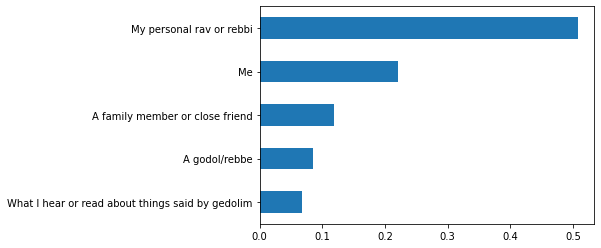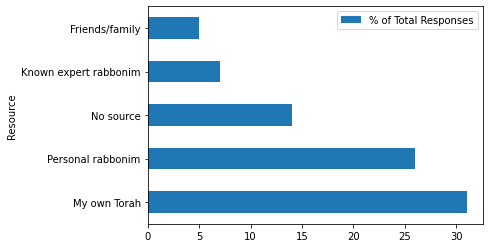Frum Opinions: Analyzing the Survey Results
Many of us aren't getting information and explanations we really want
When it comes to statistics, you can never have too much data. I would therefore have preferred getting tens of thousands of responses to my Understanding Opinions in the Frum Community survey. But considering the relatively limited reach of this publication, I'm very happy with the 100+ responses we did get. And I'm definitely grateful for each of you who took the time to submit such thoughtful answers to the questions.
I should note that those who responded were self-selecting. In other words, their responses won't necessarily truly and completely represent the total population because they weren't chosen at random. But I do nevertheless see some strong patterns in the data which suggest it does reflect real-world opinions.
Let's get down to business: what did the responses actually teach us?
First of all, I should introduce you to our subject community. From the locations in the figure that follows, they seem to nicely represent the overall English-speaking frum world, with most living in the New York/New Jersey region.
The average age of all those who responded was 38 and there were far more males than females in the group.
Exploring the results
Ok. So how does this group learn about the Jewish world and come to conclusions about the big events that confront us? As you can see from the figure below, by far the largest segment (45%) reports that their primary resources for information are frum news websites.
When asked who they thought was the most reliable and authoritative source for "addressing moral (non-halachic) decisions," it's obvious that many people prefer someone with whom they have a personal relationship. As you can see in the figure below, only 15% reported preferring direct or indirect information from a (presumably distant) gadol or rebbe.
It's also interesting to see 22% reporting themselves as their source of moral authority.
Similarly, when asked about their primary resource for forming opinions about the proper response to public scandals in the Jewish community, more than 30% suggested some variation of “my own Torah knowledge.” When you add to that the 14% who report having no reliable source, we get the sense that people are taking personal responsibility for their opinions, but don’t always feel they’re successful. We’ll hopefully get back to that a bit later.
When asked about the living rabbi they felt had the greatest positive impact on the Jewish world, respondents provided a very wide range of answers. I think it's reasonable to conclude that many value a direct connection to their leaders even over allegiance to globally-famous rabbis. This would seem to further reinforce the sense that personal relationships are often the most effective.
Nevertheless, as shown in the next chart, certain internationally-known names did come up more than others.
78% reported that they wished they had a stronger relationship with a Torah guide. Unfortunately, the phrasing of the question didn’t permit the other 22% from telling us whether they responded that way because they felt complete satisfaction with their existing relationships or because they preferred to focus on their own Torah insights.
The overall results of these next three survey questions were split almost evenly between “yes” and “no”:
“Do you feel you get enough reliable information to form Torah-inspired opinions about important issues?”
“Do you feel there is effective rabbinic leadership in your community?”
“In your experience, do you think frum Jews are sufficiently careful to act with consideration for other people and strive for kiddush HaShem in their daily lives?”
I wondered whether your feelings on those issues will be impacted by where you live. In other words, could there be a big-town, small-town skew to the data? So bearing in mind that we’re dealing with small numbers, I broke the responses down by location.
On getting enough reliable information to form opinions, the thoughts of those living in the New York/Monsey area were noticeably more pessimistic than the average:
When it comes to feeling they have effective leadership, New York stood out once again, although this time with a smaller majority:
And what about their perceptions of local behavior? That’ll definitely depend on where you live. Many more Lakewood residents feel they’re surrounded by decent, considerate people.
New Yorkers see things differently. Well, we’ve all been to New York, right?
I will repeat that this is based on a very small dataset, so don’t take those numbers too seriously.
What does it all mean?
There are two main insights I think I can identify from our results:
That there’s a strong desire for access to the “inside stories” that’ll explain our complex Jewish world, but that it’s often difficult or even impossible to satisfy that desire.
That individuals want to take responsibility for their Torah lives and make intelligent, healthy choices, and that many aren’t eager to outsource those choices to authorities they don’t know - and who don’t know them.
Considering the deeply networked structure of the frum world, it’s hardly surprising that we’ve got an outsized desire for in-depth news. Perhaps, for both practical and halachic reasons, it’s unrealistic to expect that any media company could ever meet this desire. But there’s definitely an unsatisfied appetite right now.
And considering how large and often impersonal our communities can be, it shouldn’t be surprising when people feel cut off from direct, meaningful connections to popular leaders. If, as many of us do, you’ve got a strong yeshiva background, why not try apply your own Torah wisdom to the problems you face?
How did you react to the questions from the survey and to the responses we’ve just seen? What’s our next step?













